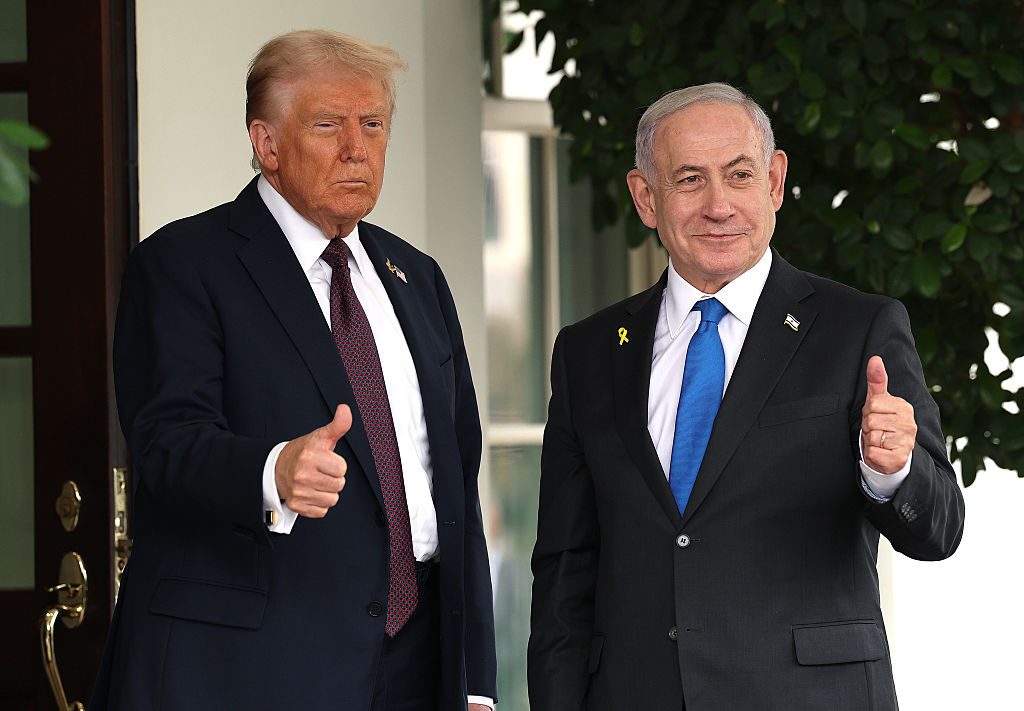Donald Trump revealed his 20-point peace plan for Gaza yesterday alongside Israeli Prime Minister Benjamin Netanyahu, who endorsed the proposal. The plan calls for Hamas to disarm, relinquish any governance over Gaza, and release the remaining hostages in exchange for an end to the fighting, the initiation of a phased Israeli withdrawal, the release of Palestinian prisoners, and an amnesty for the Hamas leadership. Gaza’s reconstruction would be administered by a board of Palestinian “technocrats” chaired by Trump himself with the help of former UK prime minister Tony Blair, and secured by an “international stabilisation force”. International aid would be resumed, Palestinians would be allowed to return, and Israel would refrain from occupying or annexing Gaza.
Not only Netanyahu, but the Palestinian Authority and a raft of Arab and Muslim countries welcomed Trump’s efforts, eager to stop the killing and regional destabilisation. Taken at face value, the plan would end the slaughter and prevent the ethnic cleansing of the strip while fulfilling Israel’s goal of destroying Hamas and Trump’s dream of a “Gaza Riviera”.
Unfortunately, the plan is unlikely to be accepted by Hamas. The essence of the proposal — that the group surrender and disarm — is not new, and has been a recurrent impasse in previous efforts to end the conflict. At the time of writing, Hamas has not officially responded to the plan, but claims to be considering it and in consultation with Arab governments.
Netanyahu’s opposition to an independent Palestinian state also means that the conditions for continued international support would likely break down if the plan were to advance toward implementation.
Crucially, the plan defers any concrete steps towards Palestinian statehood. It gestures towards an eventual transition to the Palestinian Authority after an indefinite process of reform, but lacks any definite commitment to an independent Palestinian state. The final stage of withdrawal by the IDF would retain a “security perimeter” around Gaza which would effectively give Israel continuing control over the strip’s borders, not unlike the status quo ante bellum. In the interim, during its indefinite trusteeship under Trump, Gaza will be opened up to significant foreign economic interests in the name of its reconstruction and development, putting its future independence in severe question.
Trump himself acknowledged during his remarks that “[i]n our meeting today, Prime Minister Netanyahu was very clear about his opposition to a Palestinian state.” Netanyahu thanked the US President for his rejection of Western allies’ recognition of a Palestinian state, saying this “would be an outcome that, after October 7, would reward terror, undermine security, and endanger Israel’s very existence”. In response to Trump’s plan, Israeli Communications Minister Shlomo Karhi also reiterated that “[t]here will never be a Palestinian state in the land of our forefathers.” In recent weeks, Netanyahu has repeatedly insisted he will never allow a Palestinian state “west of the Jordan River”, and has approved plans for new settlements that bisect the West Bank. His opposition on principle to an independent Palestinian state has been long-standing; the chances that he, or his government, have undergone a sudden change of heart are small.
On humanitarian grounds, we should all want an immediate end to the killing in Gaza. Tragically, the principal actors — Hamas and Israel — are unlikely to accept the political terms needed for a mutually acceptable settlement. Nor is Trump willing to stop US military and economic aid to Israel to constrain Netanyahu, even as US public support for Israel plummets. Netanyahu made clear during his comments at the White House that the proposal is also an ultimatum, stating that if Hamas rejects the proposal, “Israel will finish the job by itself.” This is, sadly, the most likely outcome.











Join the discussion
Join like minded readers that support our journalism by becoming a paid subscriber
To join the discussion in the comments, become a paid subscriber.
Join like minded readers that support our journalism, read unlimited articles and enjoy other subscriber-only benefits.
Subscribe